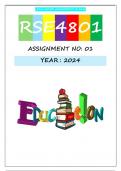LOLA JACOBS ASSIGNMENTS © 2024
RSE4801
ASSIGNMENT NO: 01
YEAR : 2024
, LOLA JACOBS ASSIGNMENTS © 2024
· Guidelines on assignment 1 (to be provided)
You are also encouraged to attend the weekly online sessions, details of which are posted in
the announcements.
Assignment questions
Question 1 (LU 1)
Learning Unit 1 describes different aspects of becoming a researcher such as ‘journey’,
‘curiosity and courage’, ‘intervention’ and ‘social justice and critique’.
Describe how these aspects apply to Smith becoming a researcher.
How do you think these aspects apply to your own becoming a researcher in education?
ONLY TAKE THE INFORMATION YOU NEED
ANSWERS:
1. Journey:
o Smith’s Journey: Linda Tuhiwai Smith’s journey as a researcher is
marked by her commitment to decolonizing methodologies. She traces
the history of scientific knowledge, exposing its racist practices and
exploitation of indigenous peoples. Her work challenges established
norms and seeks to empower marginalized communities.
o Your Journey: As you embark on your research journey, consider how
your experiences, values, and interests shape your path. Like Smith,
you may encounter false starts, cycles, and retracing steps. Your
fidelity to the research focus will require adjustments and refinements.
The Journey of Becoming a Researcher:
Reflections on Linda Tuhiwai Smith and
My Own Path
Research is not a mere technical exercise; it is a transformative journey. As we
embark on this path, we encounter challenges, surprises, and opportunities for
growth. In exploring the journey of Linda Tuhiwai Smith, a committed advocate
for decolonizing methodologies, and reflecting on my own trajectory, we uncover
the essence of becoming a researcher.
Linda Tuhiwai Smith: Decolonizing the Mind
Linda Tuhiwai Smith’s journey is marked by courage and conviction. She refuses
to accept the status quo, challenging the racist practices embedded in scientific
knowledge. Her work exposes the exploitation of indigenous peoples,
dismantling established norms. Smith’s commitment to decolonizing
, LOLA JACOBS ASSIGNMENTS © 2024
methodologies is a call to action—a demand for justice, empowerment, and
transformation.
Smith’s path is not linear; it meanders through false starts, retraced steps, and
unexpected turns. She grapples with the complexities of reality, acknowledging
that knowledge is not neutral. Her journey is not about confirming paradigms; it is
about disrupting them. Smith’s research is an intervention—a force for change.
She empowers marginalized communities by amplifying their voices and
reclaiming their knowledge.
My Journey: Navigating Curiosity and Challenges
As I step onto the research path, I bring my experiences, values, and interests. Like
Smith, I encounter false starts—ideas that fizzle out—and cycles of exploration. My
research focus evolves, requiring adjustments and refinements. The fidelity to my
purpose keeps me grounded, even when I retrace my steps.
Curiosity fuels my journey. I question assumptions, seeking deeper understanding.
Just as Smith challenges dominant paradigms, I explore alternative perspectives.
Curiosity is my compass, guiding me toward uncharted territories.
Courage accompanies curiosity. It takes courage to challenge norms, to question
the powerful. Smith’s will to power resonates—I, too, want to wield knowledge for
good. But courage also means acknowledging biases, examining my motives. Am I
perpetuating existing power structures, or am I disrupting them?
Intervention:
o Purposeful Change: My purpose is intervention—to make a difference
in educational practices. Like Smith, I aspire to transform education.
But intervention is not only external; it’s intrinsic. The methods I choose
shape reality.
o Influence on Participants: Just as Smith’s work empowers
marginalized communities, my research methods influence
participants. A questionnaire affects their views; an interview reveals
hidden layers. Research is not passive observation; it actively shapes
education.
Social Justice and Critique:
o Challenging Power Dynamics: Striving for social justice drives my
inquiry. I critique established norms, aware that power flows through
knowledge. Social justice demands inclusion—subjugated knowledges
deserve recognition.
o Alternative Perspectives: I seek to amplify marginalized voices. By
questioning dominant discourses, I contribute to a more equitable
educational landscape.




